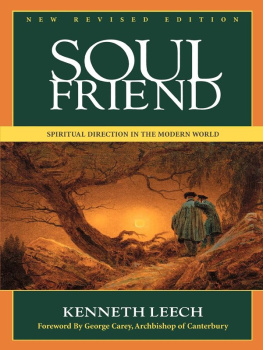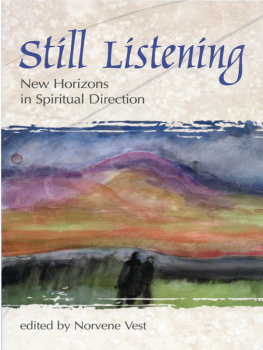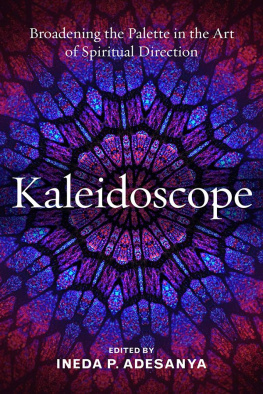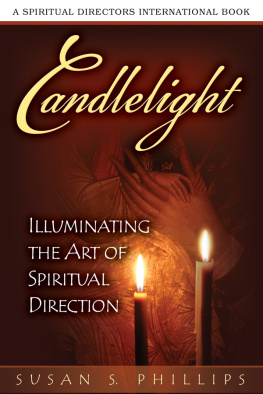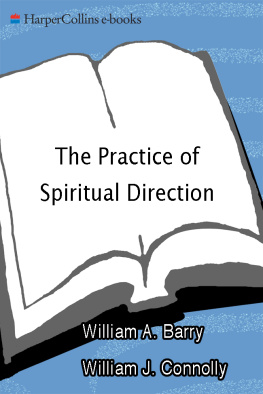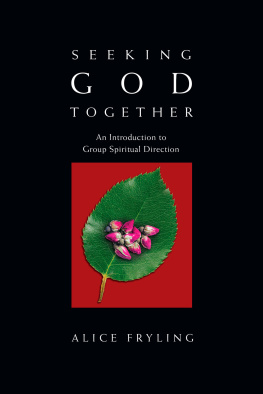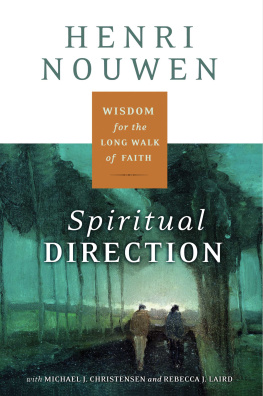Copyright 2001 by Kenneth Leech
Morehouse Publishing
P.O. Box 1321
Harrisburg, PA 17105
Morehouse Publishing is an imprint of Church Publishing, Inc.
All rights reserved. No part of this book may be reproduced or transmitted in any form or by any means, electronic or mechanical, including photocopying, recordings, or by any information storage and retrieval system, without written permission from the publisher.
This edition published in 1994 by Darton, Longman, and Todd, Ltd., 1 Spencer Court, 140142 Wandsworth High Street, London SW18 4JJ, U.K. Reprinted 1996, 1998, 2000. First published in Great Britain in 1977 by Sheldon Press, Marylebone Road, London NW1 4DU, U.K.
Cover design by Wesley Hoke.
Library of Congress Cataloging-in-Publication Data
Leech, Kenneth.
Soul friend : spiritual direction in the modern world / Kenneth Leech ; foreword by the Archbishop of Canterbury.
p. cm.
Includes bibliographical references and index.
ISBN 0-8192-1888-X (alk. paper)
1. Spiritual direction. I. Title.
BV5053 .L435 2001
253.5'3dc21
2001030136
Printed in the United States of America
06 07 08 09 10 9 8 7 6 5 4
Anyone without a soul friend
is a body without a head.
CELTIC SAYING
Foreword
When it was first published, Soul Friend opened a door for me, and for many of my generation. It was a door through which we could walk and discover more of the richness of Christian spirituality. My predecessor, Michael Ramsey, was quite right when he said of it: Here at last we have a work on the cure of souls which understands the trends of the present day and at the same time draws upon the deep tradition of Christian spirituality in the work of counsellor, confessor and spiritual director.
Since then, of course, spirituality has become a buzz word within a wide variety of Christian traditions. Spiritual directors are to be found not just in the Catholic wing but amongst Evangelicals and Charismatics as well. I welcome many of the developments within the field of spiritual direction, but, like Kenneth Leech, I am increasingly worried by the individualistic nature of some of them and also by the sense of superior exclusiveness encouraged by a few practitioners. There are plenty of examples from the past from the Letters to the Corinthians onwards of those who wish to set themselves up as a spiritual lite. Such groupings have, without exception, brought damage to the Church of God.
How refreshing then that Soul Friend places spiritual development firmly within the corporate and sacramental life of the Church. The growth of an individual's relationship with God cannot be set apart from their relationship with their fellow Christians. It is my hope that this new edition will bring to another generation a wealth of fresh insights similar to those which were shared by my own.

Notes to the revised edition
So much has happened since 1977 that I was tempted to embark on a major rewriting of much of the text. Yet it seemed important to revise the book in such a way that it was recognizably the same book. And in fact, as I read it, I realized that the main body of the work has survived and needs no major change. So I have concentrated on four areas.
First, I have tried to remove sexist language. However, it is important that we honestly recognize both the sexism within the Christian tradition and the cultural conditioning in the use of language. I have therefore retained the original language of all citations. I have also avoided the cumbersome usage of him or her and have alternated the use of masculine and feminine forms, unless the chronology of the context demands otherwise. Because the ordination of women to the priesthood is a fact in many parts of the Anglican Communion, though not yet in the Roman and Orthodox churches, I have also used she and her in reference to priestly ministry.
Secondly, I have added a new Introduction, though I have kept virtually all the material which was in the original Introduction.
Thirdly, I have added small amounts of material to the text, and have corrected one or two minor historical errors. I have also expanded several footnotes to take account of recent developments.
Finally, I have greatly expanded the bibliography. Even so, there is much material which I have had to omit, but I hope that I have included most of the significant works which have appeared in this field since 1977.
I am grateful for help and suggestions in revising the book to Jan Baltz, Janet Batsleer, the Revd Martin Dudley, the Revd Tilden Edwards, the Revd David Goodacre, Margaret Hebblethwaite, Sister Isobel Mary SLG, the Revd Dr Margaret Guenther, the Revd Paul James, Fr David Lonsdale SJ, Sara Maitland, and Dr Gerald May; to Fr Simon Tugwell OP, and Fr Richard Woods OP, for helping me correct some historical errors about the early Dominicans; and to the Revd Winston Crum, formerly of Seabury-Western Seminary, Evanston, for inviting me to speak to his students about a possible revision of the book many years before I would otherwise have thought about it.
Introduction to the revised edition
It is over fifteen years since I wrote the first edition of this book. First published in Britain in 1977, it had grown out of a School of Prayer for Anglican ordinands which I led at St Augustine's College, Canterbury, during the years 1971 to 1974, when I was tutor and chaplain there. During one session of the School we devoted most of the time to a course on spiritual direction, and the papers which were given during this course were enlarged and expanded to form the heart of the present book.
In my Introduction to the first edition I explained the aims and limitations of the study. It is not an original work so much as an attempt to bring together in an accessible form an accumulated body of wisdom and guidance from the Christian spiritual tradition. It is therefore a compendium of resources which may serve to introduce people to the rich and diverse world of Christian spirituality. It is certainly not meant to be a popular handbook or a practical guide to the work of spiritual direction. I stressed in 1977 that I had grave doubts about whether it was possible to produce such a book, and that, if it were, it would be a dangerous enterprise. Still less would I be competent to produce such a guide even if it were desirable. I believed then, and believe even more strongly now, that the ministry of spiritual direction cannot be learnt from books, but only from personal experience in prayer and pastoral care. It is not true to say that spiritual directors are born and not made; but they are always miracles of grace, charismatic persons in the true sense of that abused word. The purpose of this study is to try to provide some nourishment for this important ministry by drawing on the teachings of the great spiritual guides and to try to help those who are themselves seeking direction on the spiritual way, and who wish to know more about the Christian tradition of prayer.
When I wrote the book, it was common to find writers lamenting the decline of the priest as pastor and speaking of a crisis of identity. For example, it was claimed that the ordained man is no longer wanted, as he was a few years ago, in helping people with their interpersonal relationships. The priest therefore is reduced to either searching around frantically for a new role, or dealing almost exclusively with that remnant, continually getting smaller, who faithfully attend public worship. This was certainly to oversimplify the picture and to overstate the case, but it seemed to me to contain an important element of truth. The crisis of identity among many priests had occurred at the very time that thousands of people were seeking spiritual guidance and could not find it. I wondered if perhaps the reason that many clergy felt underemployed was that what they had to offer was not what was needed.

